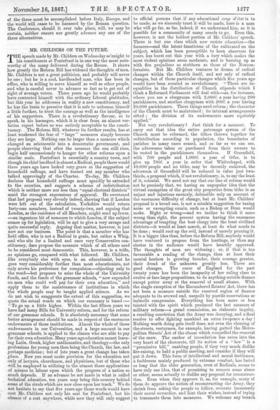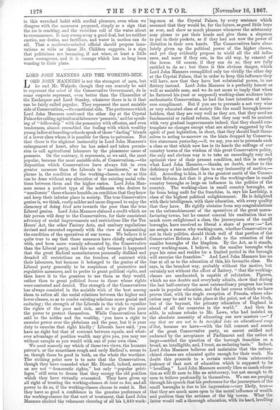MR CHILDERS ON THE FUTURE.
THE speech made by Mr. Childers on Wednesday se'nnight to his constituents at Pontefract is in one way the most note- worthy of the many delivered during the Recess. It shows how greatly the Reform Bill has widened the thoughts of men. Mr. Childers is not a great politician, and probably will never be one ; but he is a cool, hardheaded man, who has been in office, who is willing to serve himself as well as other people, and who is careful never to advance so fast as to get out of sight of average voters. Three years ago he would probably have contented himself with the ordinary Liberal platitudes, but this year he addresses in reality a new constituency, and he has the brain to perceive that it is safe to unbosom himself a little further, to trust the courage as well as the intelligence of his supporters. There is a revolutionary flavour, so to speak, in his harangue, which it is clear from an almost ver- batim report before us was entirely acceptable to the consti- tuency. The Reform Bill, whatever its further results, has at least weakened the fear of " large " measures simply because they are large. Nothing can be larger than a measure which changed an aristocratic into a democratic government, and people observing that after the measure the sun still rises, begin half unconsciously to hunger for other reforms upon a similar scale. Pontefract is essentially a country town, and though its chief landlord is almost a Radical, people there would three years ago have looked very grave at the suggestion of household suffrage, and have turned out any member who talked approvingly of the Charter. To-day, Mr. Childers declares that household suffrage must speedily be extended to the counties, and suggests a scheme of redistribution which is neither more nor less than "equal electoral districts" amid the strongest expressions of approval. He sweetened that last proposal very cleverly indeed, showing that if London were left out of the calculation, Yorkshire would return forty-one members, instead of twenty-two, and arguing that London, as the residence of all Members, might send up fewer, —an ingenious bit of nonsense to which London, if the subject comes up for legislation, will be apt to give a very savage and quite successful reply. Arguing that matter, however, is just now not our business. The point is that a member who has held office, who is not a Radical in grain, but rather a Whig, and who sits for a limited and once very Conservative con- stituency, dare propose the measure which of all others used to be considered most democratic. This, however, is a trifle, .as opinions go, compared with what followed. Mr. Childers, like everybody else with eyes, is an educationist, but he goes very considerably further than most educationists, not .only avows his preference for compulsion—objecting only to the word--but proposes to seize the whole of the University funds, and the funds of the grammar schools, "now expended on men who could well pay for their own education," and apply them to the maintenance of institutions in which the whole people may be taught applied science. As we do not wish to exaggerate the extent of this suggestion, we quote the actual words on which our summary is based :— "To go up a little higher. Within the last fifteen years we have had many Bills for University reform, and for the reform of our grammar schools. It is absolutely necessary that some better arrangement should be made in respect of the enormous endowments of those institutions. Almost the whole of those endowments in our Universities, and a large amount in our grammar schools, is applied to the classes who are able to pay for their own education. Many years ago education meant learn- ing Latin, Greek, higher mathematics, and theology—the only professions for young men then being the Church, the law, and perhaps medicine; but of late years a great change has taken place. Now you must make provision for the education not only of lawyers, churchmen, and physicians, but of those who will be employed in utilizing to the utmost those applications -of science to labour upon which the progress of a nation so much depends. If an advance be not made in what is called technical education, ten years may bring this country behind some of the rivals which are now close upon her track.' We do not hesitate to say that five years ago those words would have cost Mr. Childers not only his seat for Pontefract, but his chance of a seat anywhere, while now they will only suggest to official persons that if any educational coup d'etat is to be made, as we sincerely trust it will be made, here is a man who will go far, as far, indeed, if we understand him, as it is possible for a community of many creeds to go. Even this, however, is not the boldest portion of Mr. Childers' speech. There is but one class which now resists education—the farmers—and the latent fanaticism of the cultivated on the subject, which has been perceptible to keen observers for years, has burst out this year with a fury which makes the most violent opinions seem moderate, and is burning up as with fire prejudices so stubborn as those of the Noncon- formists. But Mr. Childers ventures to dream of radical changes within the Church itself, and not only of radical changes, but of those particular changes which five years ago would have been scouted as revolutionary. "There are in- equalities in the distribution of Church stipends which I think a Deformed Parliament will deal with—as, for instance, where you see a clergyman with 2,000/. a year having 200 parishioners, and another clergyman with 2001. a year having 20,000 parishioners. These things need reform ; the character of the Church must be maintained ; its internal arrangements sifted ; the division of its endowments more equitably applied."
Not very revolutionary? Just think for a moment. To carry out that idea the entire patronage system of the Church must be reformed, the tithes thrown together for redistribution according to population, the boundaries of parishes in many cases erased, and as far as we can see, the advowsons taken or purchased from their owners to be vested in the parishioners themselves. If Greenfield, with• 700 people and 1,000/. a year of tithe, is to give up 700/. a year in order that Whitechapel, with. 40,000 people and no tithe, may be decently endowed, the advowson of Greenfield will be reduced in value just two- thirds, a proposal which, if not revolutionary, is, to say the least of it, colonial. We need not say that our line of reform would not be precisely that, we having an unpopular idea that the virtual exemption of the great city properties from tithe is an unjust and injurious anomaly, defensible only on account of the enormous difficulty of change, but at least Mr. Childers' proposal is a broad one, is not a minikin suggestion for taxing anise or exempting cumin, such as a Bishop or Dean would make. Right or wrong—and we incline to think it more wrong than right, the present system having the enormous advantage of tempting the best clergy into the least civilized districts—it would at least march, at least do what needs to be done ; would root up the evil, instead of merely pruning it. It is a bigger idea than, before the Reform Bill, anybody would have ventured to propose from the hustings, or than any elector in the audience would have heartily approved. The thoughts of men are widening ; or, if that is too favourable a reading of the change, then at least their mental horizon is growing broader, their courage greater, their dread of the unknown greatly less. These are good changes. The curse of England for the past twenty years has been the incapacity of her ruling class to evolve or face large propositions, to do anything outside finance except potter away at the removal of small abuses. With the single exception of the Encumbered Estates' Act, there has not been a measure outside the reserved region of finance adequate to its avowed end, unspoilt by puerile reservations or imbecile compromise. Everything has been more or less tainted with the spirit which produced the last measure of military reform—a grand commission, an elaborate inquiry, a resulting conviction that the Army was decaying, and a final resolve to offer fighting mankind an extra twopence a day Nothing worth doing gets itself done, not even the cleaning of the streets, vestrymen, for example, having gutted the Metro- politan Streets' Act of the clause which compelled the removal of the snow. The canker of irresolution has eaten into the very heart of the electorate, till its notion of a " law " is a "permissive bill," enabling people, if they very much dislike fire-raising, to hold a public meeting, and consider if they will put it down. This form of intellectual and moral feebleness, a feebleness mainly produced by extreme comfort, has lasted so long that the elder generation, even of Radicals, seems to have only one idea, that of promising to remove some abuse or other, seems actually to dislike any proposal for reconstruc- tion. Even when they approve it, as, for example, many of them do approve the notion of reconstructing the Army, they shrink from asking the people to follow, overrate immensely their moral cowardice, and hint their wishes, instead of trying to transmute them into measures. We welcome any breach in this wretched habit with cordial pleasure, even when we disagree with the measures proposed, simply as a sign that the ice is cracking, and the resistless roll of the water about to recommence. It may sweep away a good deal, but ice neither carries, nor drains, nor fertilizes, and water in motion can do all. That a moderate-minded official should propose inno- vations so wide as those Mr. Childers suggests, is a sign that politicians are becoming, if not wiser, at least a little more courageous, and it is courage which has so long been wanting to their plans.



































 Previous page
Previous page